Does Wiki, Google, or Yahoo Link You To Cryptozoology?
Posted by: Loren Coleman on January 18th, 2007
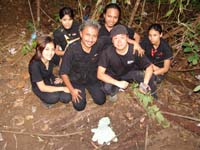
What can job seekers find out about you by looking at your FaceBook, YouTube, and Wikipedia? Doing a search for you and your activities via Google, Yahoo, MSN Search, Quintura, or yes, by visiting Ask Jeeves would reveal what? Have you been mentioned in Cryptomundo, at The Anomalist, or on Boing Boing? Well, maybe Boing Boing would just be cool, right?
Anyway, that’s been a concern, hasn’t it? It has been discussed in job career internet sites for awhile. College placement services have been feeding into the fears. Recent college graduates who only two years ago had posted their beer bash pictures (and more) online have begun to panic that their potential future employers might be surfing the web to find out all about them. Some people have even worried about their links to cryptozoology. But what if you actually were on a past expedition looking for the Death Worm, Mothman or Sasquatch? That info is out there too.
What if this fear of discovery is all being too overemphasized and the negative ridicule factor is being overblown?
Can an interest in cryptozoology merely make you a little more human? More open-minded? More intriguingly to those serving as the entryways to your academic wishes? Or to your next boss?
And how about your power in your job or academic hunts?
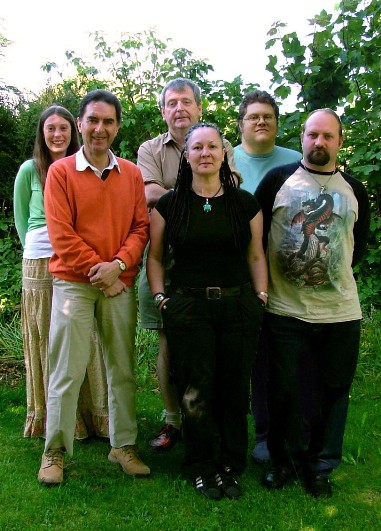
This game can be played two ways.
The search committees are not the only people using Wikipedia these days. The increasing use of Wikipedia and other internet searching can take place in the other direction.
Nora L. Corrigan is a doctoral candidate in Renaissance literature at the University of North Carolina at Chapel Hill. She writes of her search for her first tenure-track job, in an article in today’s Chronicle of Higher Education, entitled “Too Much Information?”
You might be pleasantly surprised by the example she utilizes.
The following is a selection from the beginning one-fourth of her article, which I extract here, through her interesting plateau conclusion that can be directly applied to your cryptolife.
Corrigan writes:
“The wiki is evil,” said one of the other graduate students in my department, referring to the Web site where job candidates share information about the status of various searches.
The rest of us nodded knowingly.
“But if I know it’s evil, why can’t I stop looking at it?”
Most academic job-seekers are information addicts. We like to do research. It’s what we do best, and it’s easier to do now than it has ever been before.
Ten years ago, when I started checking out doctoral programs, departmental Web pages were businesslike. I counted myself lucky if I could find a list of faculty members online, let alone any information about graduate-student life or the courses I might be teaching. These days, a few clicks on most departmental Web sites reveal photo galleries, detailed course syllabi and CV’s, and the occasional blog.
While doing research on job openings, I often found myself browsing the faculty profiles and learning that one of my potential colleagues had a young son who collected coins — or, in one memorable instance, that the head of the search had published an article about Bigfoot.
I found those bits of information encouraging. They made the search committees seem less like capricious gods and more like human beings and potential colleagues.
So job seekers, maybe putting cryptozoology and hominology – and your articles and quests for Bigfoot – out there in the world of your virtual resume could actually help! You never can tell, anymore, who is sitting on the other side of that interviewing table. Well, that is, unless you do your own research!
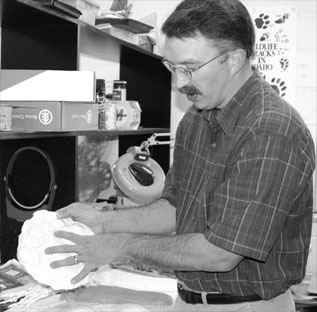
About Loren Coleman
Loren Coleman is one of the world’s leading cryptozoologists, some say “the” leading living cryptozoologist. Certainly, he is acknowledged as the current living American researcher and writer who has most popularized cryptozoology in the late 20th and early 21st centuries.
Starting his fieldwork and investigations in 1960, after traveling and trekking extensively in pursuit of cryptozoological mysteries, Coleman began writing to share his experiences in 1969. An honorary member of Ivan T. Sanderson’s Society for the Investigation of the Unexplained in the 1970s, Coleman has been bestowed with similar honorary memberships of the North Idaho College Cryptozoology Club in 1983, and in subsequent years, that of the British Columbia Scientific Cryptozoology Club, CryptoSafari International, and other international organizations. He was also a Life Member and Benefactor of the International Society of Cryptozoology (now-defunct).
Loren Coleman’s daily blog, as a member of the Cryptomundo Team, served as an ongoing avenue of communication for the ever-growing body of cryptozoo news from 2005 through 2013. He returned as an infrequent contributor beginning Halloween week of 2015.
Coleman is the founder in 2003, and current director of the International Cryptozoology Museum in Portland, Maine.

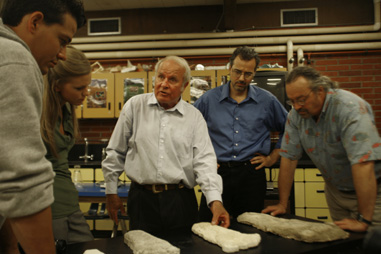





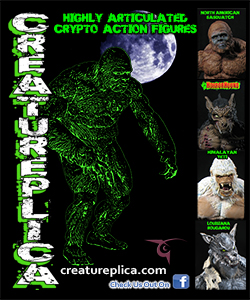
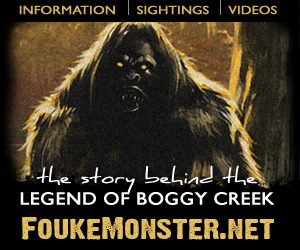
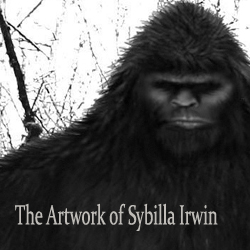

Great question! I’m gonna go Search for me!
Somebody might want to enlighten me about how detailed the search on our names can get.
But it’s one reason so many of us don’t use our real names on sites like this.
No, not THAT reason. Shame has nothing to do with it. It’s just that when it comes to things like cryptozoology, most people, including many of our potential friends/boyfriends/girlfriends/employers, are ignoramauses. (As nice and wonderful as they might be on other topics of interest to us.) I like to minimize the amount of time I spend dealing with ignorance, that’s all.
When I type in my name, I’m on the first page of both Google (3rd on page) and Yahoo (ninth on page) thanks to my interest in Cryptozoological matters. But still not important enough to warrant a Wikipedia entry. LOL
It’s just not good enough, I must do better in future.
I agree with DWA. I am not ashamed of this, but there are bills to pay, mouths to feed, and what I do does not really invite itself to my telling everyone I’m a closet cryptozoologist. A lot of people just might not understand. If I did this for a living and my reputation was built on this field, I would not have any qualms about using my real name. But as it is, I do not have that luxury.
From person experience, the affect of the Internet in usage of job searches and prospect evaluations can be beneficial. It aids in character review as well as verification of some details that may be on a paper resume or elsewhere, it can be a beneficial tool.
As for job seeking, I can only speak from experience. One should not lie on a resume, but you can be selective in presentation. I list on my resume, for example, cryptozoology. Not as a cryptozoologist, but as a writer, researcher and editor in association to certain publications. It is only a snippet, and also breaks the room during an interview and allows for an open conversation about thinking outside the box, structural ideas and systematic methodology.
But, each career and job is different. In academic areas, the cryptozoology connection could be problematic as well as political or governmental. While in service and manufacturing areas it is not always a detriment. This is particularly true if the distinction between work and cryptozoology is set-up in a way that allows these entities to co-exist together. Tap the skills you learn in cryptozoology, such as research, interviewing and writing, and use them in your career. This spin on it can help, as it turns the stigmata into a positive usage of acquired knowledge.
Now, my perspective is from manufacturing and consulting on both the job seeking and hiring basis. It is not concrete, and in the end it comes down to personal choice as to disclosure or non-disclosure of identities online.
Craig Heinselman
Peterborough, NH
I can see where some people might get nervous. I did a search for my name on Google and it only had 1 hit that was actually me. A story that included me when I testified to the state legislature about proposed Medicaid cuts. Tho a search on Google for the first part of my email address caused 3 pages of relevant hits. Everything from me being a a maker of PocketPC themes to me being a leg amputee. Also included were my MySpace page, Yahoo360 page, and more. Luckily I don’t put anything online that I’m not proud of! LOL
I’d recommend to people to use one email address for everyday stuff and to make a new email address when looking for work. That way a search for it won’t pull up any results. Name searches can pull up a lot of stuff about people that aren’t you. Mine had me finding out that there was a Ship Captain with my name in the 1800s. So I don’t see that hurting most people.
I’m a famous novel character.
But I don’t use my name on the Net. As one of my fave anime characters said when asked his name “Oh, I’ve gone beyond such things as names…”
(And my True name isn’t used “anywhere.”)
Well, I guess I wasn’t directing this to people that are obviously hiding their identities from everyone with fake names, fake activities, or fake emails. They don’t care about their real links to cryptozoology being celebrated anyway, it seems.
No, I was talking about those people that are real, use their real names, and turn up in the searching, quite easily.
It can be an advantage, especially, as I was trying to point out, as you may be seen as more interesting than most people. Besides, the person interviewing you may be into Bigfoot as much as you are. The world is changing, and actually being intrigued by cryptozoology has become a positive and creative part of our culture.
I just like my little login name. My mother, alas, did not choose to name me after cats. So I chose my own name lol.
Seriously though, I like my privacy, but that’s not entirely the reason I don’t give my real name online in blogs.
My online name gives me a feeling of being an explorer on another planet. That sounds trite but it comes closest to what I feel.
When I begin interacting with the Cryptomundo community, for instance, I feel like this little window into which I type is a window into another world. And my little online name is just my family name in this community.
I used to use my name alan borkwood as my very first mail name, but someone from my past started subscribing the address to sites which had me receiving hundreds of emails along the lines of, “Hi, my name’s Bruce, I’m a biker into tight leather. I’ve got an enormous handlebar…moustache, and I’d like to spread my butter on your buns.”
And, now while it’s true my frequent visits to Cryptomundo betray an interest in unusual and exotic critters, there’re some critters just too unusual and exotic even for me!
I had done a search on my name previously on all the major search engines and it appears I’ve garnered more hits than I realized on certain ones. I think anyone who should happen by chance on my name it’ll give them a reasonable perspective on my diversity of interests. So it goes.
A national radio show on computers and electronics discussed this issue a couple of months ago, she had the exact stats, but it was something along the lines of 65% of employers will ‘google’ prospective applicants. And that of these, around 80% were not hired based on something that came up on the web. The example was given of a blog that had shown the guy getting wasted at a family reunion. But I don’t know if being linked to a crypto website would be that bad of a thing, would it?! But a good valid point as the ease of technology has tended to make us a bit careless!
Never really thought about it much, but I’ve been told I am a little open with using my real name on the net. I look at it this way- I am who I am, and if I don’t do anything I’m not proud of, why should I care? My first and last names are common enough that when I searched for my name in some people-finder program years ago I found 4 others with that name in my state, and well over a thousand in the US. My middle name, however, is very unique. A quick Google search of my full name only shows one link- as a “newshound” for the Fortean Times website’s Breaking News section.
My online name, on the other hand, links me to comments on several blogs, first and foremost this one, but that doesn’t bother me. I’m proud of my association with this site, and I stand by everything I said (Unless the facts dispute me, in which case I’ve usually corrected myself, and thus stand by my stated corrections), so why worry? True, someone could learn a lot about me from my various postings- my interests in CZ, paleontology, science in general, and the paranormal, along with my strong belief that global warming is a serious danger, and that something must be done to curb habitat loss and the current rate of extinction being just the more obvious examples. Again, I don’t see that as a bad thing, it’s not like anybody’s getting my credit card numbers or anything. OK, so they’ll quickly learn that I live in NJ near Atlantic City, but not enough to track me down and beat me up for my unrepentant intellectual ways.
I’ve learned a lot about many of the posters here too- Ole Bub, Kittenz, and so on, and like Kittenz says, that does make us sort of like some kind of family, and I kinda like that. I would also hope any future employers would see us as we are and accept us on those terms, or else, why would you want to work for them anyway?